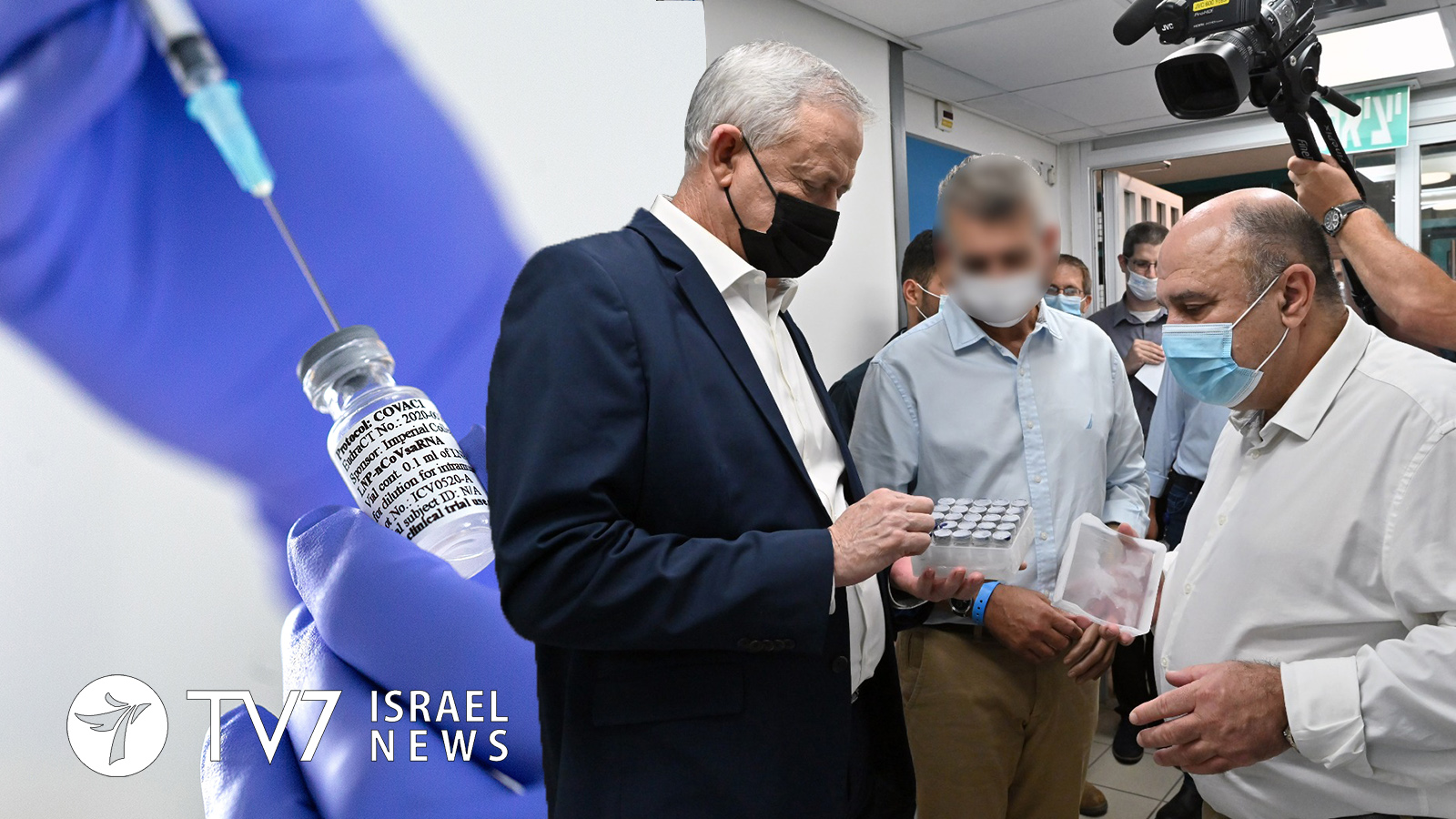The Israel Institute for Biological Research (IIBR) has announced that human trials of its coronavirus vaccine are set to get underway later this month.
The name of the Israeli vaccine was also unveiled as “BriLife,” resulting of the combining of the Hebrew word “bruit” for “health,” the abbreviation of “iL” for “Israel” further symbolizing “Israeli Life,” with an anagram of the IIBR acronym.
IIBR Director General, Professor Shmuel Shapira escorted Alternate Premier and Defense Minister Benny Gantz on a working tour of the secretive national research institute, which is affiliated with the Defense Ministry.
The laboratory is a world leader in the advancement of a COVID-19 vaccine to this stage of the process, while strictly adhering to safety and quality standards above that maintained by many competitors, some of whom have bypassed regulations while operating on vastly higher budgets.
According to a statement Gantz’ Blue and White faction sent to TV7, the top defense official was briefed on relevant details relating to the vaccine’s production and to the anticipated timetable going forward.
“We are at a very significant moment,” Gantz said. “Prof. Shapira and the entire team have done fantastic work. They are the scientific vanguard of the State of Israel.”
After saying that the success of the development “will be huge news for the State of Israel and perhaps for all nations in the world,” Minister Gantz thanked “the entire staff of researchers and administrators at IIBR” and told them “you are a source of national pride.”
Prof. Shapira said that the IIBR began working on a vaccine on 2 February and that it is now nearing completion. This means research was well underway even prior to first positive diagnosis of the disease on 21 February of an Israeli woman who had returned home from quarantine in Japan after passage aboard the ill-fated Diamond Princess cruise ship.
“We thank the Minister of Defense for the spirit, and we will continue to work for the health of Israeli citizens, and for the Israeli economy and society,” added Prof. Shapira.
Foreign media has reported that the IIBR, located in the central Israeli town of Ness Ziona, is also involved in developing national defense against chemical and biological warfare.
Israel is today reporting only 472 new cases over the past 24 hours. The total of 23,351 active cases represents a significant drop below 30,000 infections for the first time since 8 September. The nation’s fatality rate has risen to 2,268 after 5 more Israelis died of the disease.
Israel’s gradual exit from the second month-long nationwide closure to curb the epidemic began on Sunday. Prime Minister Benjamin Netanyahu noted the “rapid drop” in active cases to “just 3% infection” levels during a visit to the Coronavirus Control Center at Rambam Hospital in Haifa. “We have seen that the lockdown works quickly,” he said, while adding that Israel is now managing the crisis more effectively than “almost all” European countries “because they did not impose this lockdown.”
The Israeli leader declared there will increased enforcement of the anti-COVID-19 restrictions which remain in effect. He also called on the ultra-Orthodox Jewish community to “follow the directives,” following the illegal reopening of hundreds of religious schools.
Meanwhile, Netanyahu faced fierce condemnation in the nation’s parliament last night, at a special session entitled “The Prime Minister’s disgraceful failure to manage the economic and health crises” He had been forced to attend according to Israeli law, after 40 Members of Knesset (MKs) signed letter demanding he appear.
Netanyahu strongly defended his performance in handing the coronavirus outbreak, insisting from the rostrum that “just as we preceded the world in the first wave, so we’re preceding it in the second wave.” He rejected criticism from his political rivals, and accused opposition lawmakers of “wasting time in the Knesset instead of working.”
“I call on opposition members to not use the coronavirus to divide the nation and pick up a few votes in the polls. It’s only possible to defeat the coronavirus if we go together,” he underscored.
Many MK’s were unswayed by the Premier’s stance, and charged that he was guilty of gearing the ongoing COVID-19 exit strategy to favor his ultra-Orthodox constituency over their – and the nation’s – own best interests.
Opposition Leader Yair Lapid “Because of politics you’re not enforcing [government restrictions] as needed in ultra-Orthodox cities.” The leader of the centrist Yesh Atid party claimed “it’s a deal they have – they let Netanyahu stay on as prime minister and in exchange he will make sure they receive budgets and that the rules won’t apply to them,” underscoring, “but this time it’s harming the ultra-Orthodox public, not helping them.”
Lapid also accused Netanyahu of being distracted by “everything not relevant to the lives of Israelis,” such as his upcoming criminal trial on corruption charges. “Because of his trial, Netanyahu is running away from a clash with the ultra-Orthodox parties. He needs them so he surrenders to them. That surrender harms everyone but first and foremost it harms the ultra-Orthodox public,” he insisted.
Other lawmakers also took aim at Netanyahu. MK Asaf Zamir blamed Netanyahu for the government’s failure to pass the 2021 budget. Zamir became the first Blue and White minister to quit the coalition government his party formed with Netanyahu’s Likud faction, when he resigned as Minister of Tourism on 2 October. At the time, Zamir said “the coronavirus crisis is at best a secondary priority for the prime minister,” adding, “the personal and legal considerations are what interests Netanyahu, and this has been clear from every step he has taken.”
— By Erin Viner
